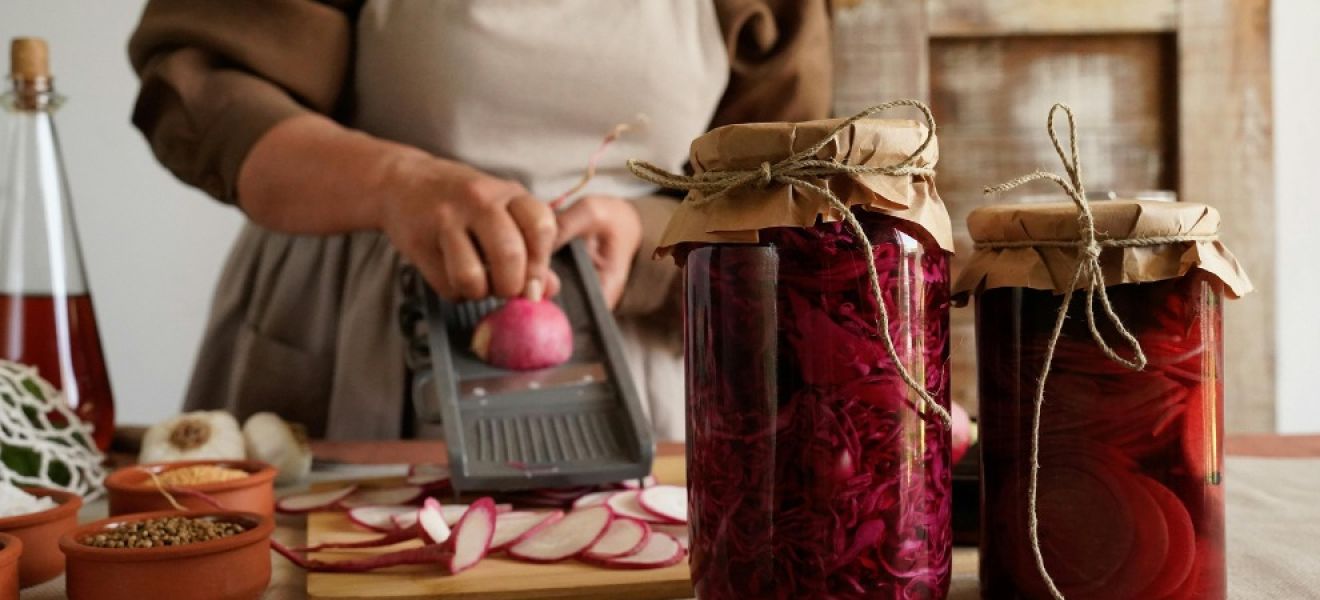
Pickles, Probiotics, and Plant Power: Exeter’s Fermented Food Revival
Imagine this: its 1941 in Britain. War rages across Europe and the Blitz has disrupted food imports across the country. The bananas have vanished. Butter, eggs, and meat are tightly rationed. You’ve just turned the flower bed into a cabbage patch and are learning, for the first time, how to preserve your food without a fridge. It sounds worlds away from today’s oat-milk lattes and artisan kombucha – but the connection is closer than you’d think.
During the Second World War, while soldiers fought abroad, British civilians were fighting their own battle at home: how to feed themselves with limited resources. In Exeter, as in towns across the UK, communities were encouraged to grow their own vegetables and preserve them using low-tech, old-world methods. Pickling, brining, and fermenting vegetables became a vital tool of survival. And now, in a strange twist of culinary fate, those very techniques are making a comeback – not in bomb shelters, but in cafés, farmers’ markets and plant-based kitchens across Devon.
A Lost Tradition, Rediscovered
Fermented plant-based foods – like sauerkraut, kimchi, and miso – have become buzzy staples among health-conscious eaters. But their modern appeal goes beyond nutrition trends. They represent a reconnection with a kind of homegrown ingenuity that was once essential.
In wartime Britain, preserving vegetables wasn’t optional – it was national policy. Posters urged families to waste nothing, bottle everything, and “pickle for victory”. The Ministry of Food even distributed leaflets on how to ferment beetroot and cabbage using both but salt, water, and patience. These were functional foods, loaded with gut-friendly bacteria and vitamins at a time when fresh produce was often hard to come by. Without knowing it, those wartime households were eating what we now pay premium prices for at farm shops.
Exeter’s Modern-Day Fermenters
Fast forward to 2025, and fermentation has shed it utilitarian image and become downright fashionable. Walk into Sacred Grounds in Exeter’s McCoy’s Arcade and you’ll find probiotic smoothies, miso-glazed mushrooms, and kimchi tucked into wraps and salad bowls. Their menu mods to both innovation and heritage – without being preachy.
A few streets away, the plant-based hotspot The Flat offers pizzas topped with fermented veg and vegan cheese that own their tang to cultured cashews and time, not dairy. Even Exeter’s Farmers Market, held on Fore Street every Thursday, regularly features local producers selling jars of vibrant sauerkraut and bottles of small-batch kombucha made with Devon-grown fruit. At The Roots Foundations, a community project focused on sustainable living and food growing, volunteers are teaching fermentation workshops that wouldn’t feel out of place in a 1940s kitchen. The revival is less about nostalgia and more about resilience – using every bit of the harvest, reducing waste, and rediscovering how flavour can come from time and microbes rather than additives.
Parallels between Then and Now
What’s striking is the overlap between wartime resourcefulness and modern plant-based ethics. Then, people fermented out of necessity. Now, we ferment out of choice – but often for the same reasons: sustainability, nutrition, and self-reliance.
Today’s climate-conscious consumer mirrors the wartime housewife more than they might realise. Both are responding to scarcity – one from bombings and U-boats, the other from ecological crisis and overconsumption. Both are stretching food, finding nourishment in simple ingredients, and rejecting waste. Even the idea of community resilience, so vital during the Exeter Blitz and post-war rationing, is making a comeback in food co-ops, local growing schemes, and fermentation workshops. There’s a comforting thought in that: in uncertain times, people still turn to plants, preservation, and each other.
A Quiet Revolution in a Jar
Fermentation, at its heart, is slow food. It resists the industrialisation of eating. It requires patience. It teaches you to trust nature and microbes to do the work. And while its being rebranded with clean labels and cool fonts, its soul remains unchanged.
The jar of kimchi you pick up from a stall in Exeter’s market isn’t just trendy – its revolutionary in the quietest way. It’s a reminder that some of the most exciting food movements are old ones in disguise. And sometimes, progress looks a lot like looking back.
So, the next time you stir miso into soup or pile fermented carrots onto a sandwich, think of the people who did the same in basements during blackouts, with no fridge and no guarantee of tomorrow. They weren’t just surviving. In their own way, they were planting the seeds of the plant-based revolution we’re now lucky enough to enjoy.
Authored by Cassie Rushe
cassrushe@gmail.com



